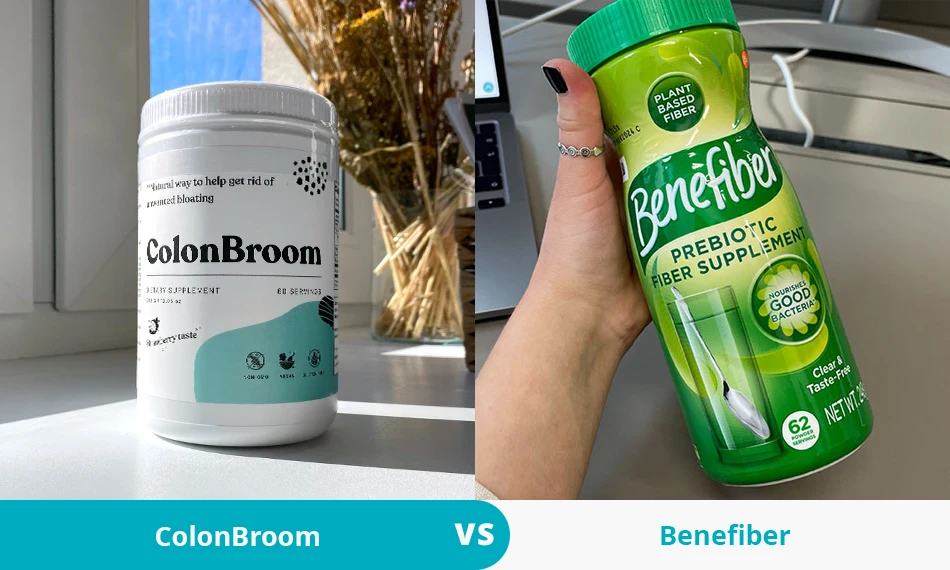How do we vet brands and products? Learn more.
ColonBroom vs. Benefiber: My Honest Verdict
Need a boost in the bathroom? Find out whether ColonBroom or Benefiber is best for tackling irregular bowel movements.
As a health expert, I’m always being asked for my opinions on popular health and wellness products. Two of the most talked about products recently are ColonBroom and Benefiber, which are both trending fiber supplements.
Dietary fiber is an important nutrient for the human body as it plays a key role in maintaining digestive health, regular bowel movements, and even heart health.
I, therefore, wanted to give my views on these two supplements to help those looking for a quick and convenient way of upping their fiber intake or relieving the symptoms of irritable bowel syndrome.
I compared the ingredients, health benefits, and drawbacks of ColonBroom and Benefiber, and here are my thoughts on which fiber supplement is best.
ColonBroom vs. Benefiber: Which Is a Better Supplement?
Despite both fiber supplements helping to cleanse the colon and improve digestive health, I’d recommend ColonBroom if you’re looking for an effective and clinically-proven product. Psyllium husk is its star ingredient, a fiber-filled herb with gentle laxative effects that relieve constipation and bloating and improve the digestive system.
In contrast, Benefiber’s only ingredient is wheat dextrin, which may not be so effective in restoring regular bowel movements.


Clinically-proven ingredients
Contains no sugar
Delicious strawberry or tropical flavors
Easy to use
Free US delivery and money-back guarantee
Dissolves easily in hot or cold beverages
Plant-based
Low-calorie
Contains no sugar
Relatively expensive
Not recommended for pregnant or breastfeeding women
May cause bloating, gas, and cramps
Not suitable for those with celiac disease
What is ColonBroom?

- Promotes good gut health and a healthy digestive system
- Facilitates bowel movements
- May help to feel more satiated
- Helps regulate blood sugar levels
ColonBroom is a dietary fiber supplement designed to help improve your gut health. What I liked most about this product is that its main ingredient is psyllium husk, a naturally-sourced fiber that makes stools easier to pass.
ColonBroom is, therefore, ideal for fighting constipation, as well as clearing away any harmful waste or toxins that may be causing uncomfortable bloating and cramps while preventing regular bowel movements.
By forming a gel-like substance in your stomach, psyllium husk also slows the digestion of glucose, which helps regulate blood sugar levels.
So, not only can ColonBroom potentially cure your digestion troubles, but it can also help keep you fuller for longer, potentially reducing the amount of calories you consume.
You can choose from a tasty tropical fruit or strawberry flavor, which simply requires mixing with water, making it easy to consume even if you’re on the go.
-
Clinically-proven ingredients
-
Contains no sugar
-
Delicious strawberry or tropical flavors
-
Easy to use
-
Free US delivery and money-back guarantee
-
Relatively expensive
-
Not recommended for pregnant or breastfeeding women
What is Benefiber?

- Increases daily fiber intake
- Nourishes good gut bacteria
- Improves gut health
- Maintains heart health
Benefiber is a plant-based fiber supplement that supports your digestive system. I liked the fact that this product contains a natural prebiotic fiber that helps nourish the healthy bacteria in the gut.
This is essential for not only a fully functioning digestive system but also nutrient absorption, immunity, and good skin health.
Like other colon cleansers, including Colon Broom and Metamucil, it contains just one main ingredient, which is wheat dextrin.
As a soluble fiber, wheat dextrin promotes regular bowel movements and makes your toilet trips more comfortable. It also contributes to lower cholesterol levels and may even help some people to lose weight.
What I enjoyed most about Benefiber is its versatility as a taste-free fiber supplement. You can add the powder to water, your morning coffee, or even to your favorite baking recipes. However, I would still like to see a flavored option for those who prefer a more fruity taste.
-
Dissolves easily in hot or cold beverages
-
Plant-based
-
Low-calorie
-
Contains no sugar
-
May cause bloating, gas, and cramps
-
Not suitable for those with celiac disease
Similarities Between ColonBroom and Benefiber
As some of the best fiber supplements on the market, while looking at the ingredients, packaging, and uses of ColonBroom and Benefiber, I found that they shared some common ground. The main similarities I identified are that they both:
- Help to increase the intake of soluble fiber
- Improve gut health
- Cleanse and detoxify the gut
- Fight constipation and bloating
- Reduce appetite by increasing satiety
- Mix well with water
Main Differences Between ColonBroom and Benefiber
I was also able to clearly see some differences when I closely compared the two fiber supplements. I’ve summarized the main ones I noticed below.
#1 Key ingredients
The first, and perhaps biggest, difference I noted when comparing the two dietary fiber supplements is that ColonBroom is made with psyllium husk, whereas Benefiber’s main ingredient is wheat dextrin. Both of these ingredients contain different types of fiber.
Soluble fiber dissolves in water to form a gel-like substance in the digestive system that helps soften stools and lower cholesterol. Insoluble fiber, on the other hand, does not dissolve in water but adds bulk to the stool, making it easier to pass and promoting regular bowel movements.
As psyllium husk contains both types, whereas wheat dextrin only has soluble fiber, I’d say that ColonBroom offers a more complete dietary fiber source to help you poop more easily.
#2 Effectiveness
As I mentioned, ColonBroom uses psyllium husk fiber to soften and add bulk to the stool, which studies show makes it highly effective in treating constipation.
In contrast, Benefiber’s wheat dextrin works as a prebiotic. This is a dietary fiber that nourishes the good gut bacteria, known as probiotics, which potentially helps treat bacteria-related constipation.
It may also be a good fiber supplement for IBS (irritable bowel syndrome). However, I’d recommend psyllium husk as a more effective fiber supplement, as studies show that, in some cases, wheat dextrin may actually decrease stool water content, which worsens constipation.
#3 Usage
To use ColonBroom, simply mix one scoop with a full glass of water twice daily, either before or after eating. One tub contains 60 servings, which should last for a month.
For Benefiber, you’ll need to stir 2 teaspoons of the powder into 4–8 ounces of your favorite hot or cold beverage or add it to soft foods.
Benefiber contains 62 servings, which is a similar amount to ColonBroom. However, I noticed that it’s recommended to take this fiber supplement 3 times a day. This means that one container doesn’t last as long as ColonBroom and may not be as good value for money, in my opinion.
#4 Taste
One of the things that immediately stood out to me about ColonBroom is that it comes in two delicious fruity flavors: strawberry and tropical fruits. The natural flavors and sweeteners provide a sweet yet non-artificial taste that will appeal to a wide range of users.
Not only do ColonBroom’s ingredients, including citric acid and crystallized lemon, taste great, but they also act as natural laxatives, helping remove toxins and fight constipation.
In contrast, Benefiber has no flavor at all, which makes it ideal for adding a fiber boost to your favorite healthy foods and drinks.
Personally, I’d be more inclined to regularly take a fiber supplement if it tastes great, like ColonBroom does. Nonetheless, it’s everyone’s choice.
Potential Side Effects of ColonBroom and Benefiber
Although they contain different ingredients, it’s important for me to note that ColonBroom and Benefiber may cause similar symptoms in terms of digestive system discomfort.
If you don’t already eat a high-fiber diet, you may find that you experience bloating, stomach cramps, and excess gas.
For those who do struggle with these symptoms, help your body adjust to the increased fiber intake by gradually building up your dosage. For example, you may choose to take ColonBroom or Benefiber just once per day at first before slowly increasing to 2 or 3 times.
If you’re allergic to psyllium, you’re also at risk of developing side effects like shortness of breath, chest tightness, itchy skin, and rashes. Stop using the product immediately if any of these symptoms occur, and consult your doctor as soon as possible.
Cost
While searching the internet, I found that Benefiber is available to purchase from a wide range of online and in-store retailers, including Amazon, Walmart, Target, and CVS, so its price varies from $12 to $15.
At the time of writing, ColonBroom is more expensive. However, I did discover some subscribe and save bundles that lower the price per container. Here’s a breakdown of how much you can expect to pay for ColonBroom:
| One-time purchase (price per month) | Subscribe and save (price per month) | |
| 1-month supply | $68.99 | $54.99 |
| 3-month supply | $44.99 | $35.99 |
| 6-month supply | $34.99 | $27.99 |
Best Fiber Supplements on the Market



Clinically-proven ingredients
Contains no sugar
Delicious strawberry or tropical flavors
Easy to use
Free US delivery and money-back guarantee
Contains raw, organic, whole food ingredients
Versatile product that can be mixed into smoothies, fruit juice, cereal, or yogurt
Vegan-friendly
Gluten and dairy-free
Can be used by those on the keto diet
Dissolves easily in hot or cold beverages
Plant-based
Low-calorie
Contains no sugar
Relatively expensive
Not recommended for pregnant or breastfeeding women
The texture is slightly grainy
Contains 120 calories per serving
May cause bloating, gas, and cramps
Not suitable for those with celiac disease
How I Compared ColonBroom and Benefiber
As a health professional, I believe in providing honest product reviews based on my knowledge and the latest scientific research. In evaluating these two supplements, I used the following criteria:
Quality
I judged the quality of the dietary fiber supplements by comparing the ingredients used, their health benefits, and potential side effects. Both use high-quality sources of fiber that come with some gastrointestinal symptoms for those who aren’t used to a high-fiber diet. They’re also free of artificial colors, flavors, and sweeteners.
Effectiveness
I consider fiber supplements effective if they meet their claims to improve gut health and regulate bowel movements. After reading the ingredients offered within both products, I conclude that ColonBroom is a more effective choice.
Studies show that psyllium husk is superior to wheat dextrin for your digestive system, thanks to its combination of insoluble and soluble fiber, as well as for improving cholesterol levels.
Price
When it comes to cost, ColonBroom is more expensive than Benefiber. However, I believe it offers better value because it provides more servings per container.
In addition, ColonBroom has a “subscribe and save” feature and offers discounts for bulk purchases, allowing for further savings.
Brand reputation
According to customer reviews and my own research, both brands have a solid reputation in the health and wellness industry.
They use only high-quality ingredients that are safe and effective for most users and show that they care about their customers by offering money-back guarantees to those who don’t get on with their products.
A Word From Our MD


Fiber is a nutrient that’s essential for good gut health, keeping your heart functioning properly, and maintaining a healthy weight. You can find fiber in a range of healthy foods, including strawberries, avocado, leafy greens, whole grains, oatmeal, and even dark chocolate.
Dietary guidelines recommend that men should eat 30–38 grams of fiber per day and women 21–25 grams, but only 5% of people in the US actually meet these goals. If you are struggling, taking a dietary fiber supplement is a convenient way of consuming enough fiber.
There are many fiber supplements on the market, but not all are suitable for everyone. It’s important to consult your doctor before adding a new fiber supplement to your routine, especially if you’re pregnant, breastfeeding, or taking other medications.
FAQs
Yes, ColonBroom delivers 3 grams of dietary fiber and 2 grams of soluble fiber per serving. This makes it an ideal fiber supplement for increasing your daily intake of fiber, relieving constipation, and improving your digestive system.
Metamucil is similar to ColonBroom as it also contains psyllium husk to aid the health of your digestive system.
However, it’s important to note that Metamucil is packed with artificial sweeteners and flavors that may have some negative side effects.
These two fiber supplements deliver different types of fiber in the forms of psyllium husk and wheat dextrin.
Benefiber is taste-free, and ColonBroom comes in two fruity flavor options. Both products also have different recommended doses, uses, and prices, with ColonBroom being on the pricier side.
My Final Verdict
Both supplements are beneficial for intestinal health, but I tend to recommend ColonBroom over Benefiber. What stands out to me is that ColonBroom offers two fruity flavors, while Benefiber only offers one flavor-free option. In addition, ColonBroom’s ingredient list is more impressive.
While Benefiber provides a good dose of prebiotic fiber from wheat dextrin to balance your gut microbiome, ColonBroom offers both insoluble and soluble fiber.
It’s important to note, however, that not every fiber supplement is right for everyone. If you’re unsure, it’s always best to consult a healthcare professional to determine the right choice for your needs.

















































 Select your language:
Select your language: 












